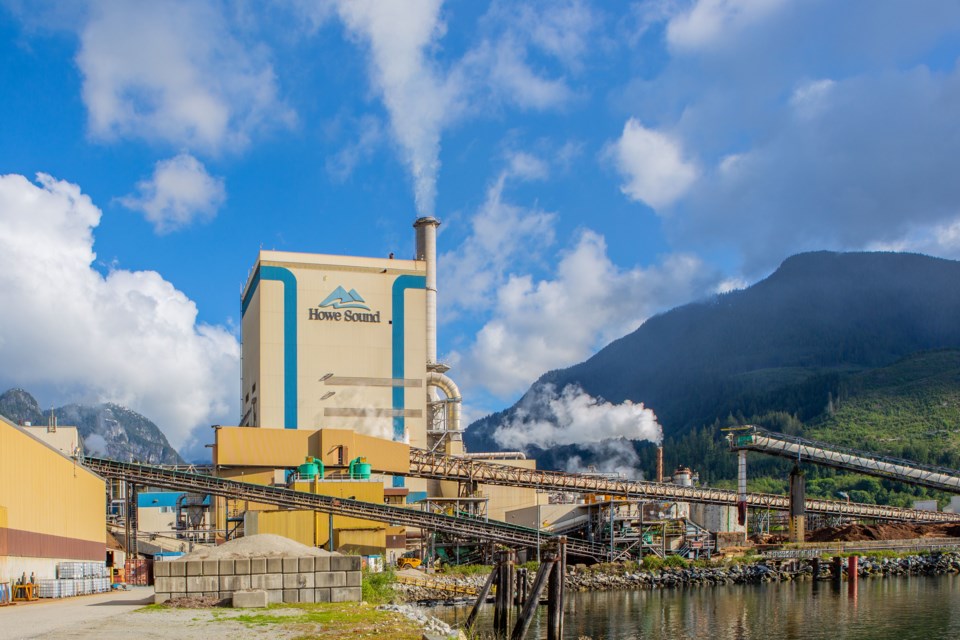Three projects that will reduce greenhouse gas emissions from Howe Sound Pulp and Paper’s (HSPP) Port Mellon mill by about 15 per cent are under way thanks to nearly $1.7 million in funding from the province. News releases from both the Ministry of Environment and Climate Change Strategy and local Member of the Legislative Assembly (MLA) Nicholas Simons’ office announced the CleanBC program funding for the initiatives on Jan. 31.
HSPP and parent company Paper Excellence are contributing $750,000 for their portion of the cost-shared equipment modernization costs. The initial project is an upgrade to the biomass boiler, which will reduce natural gas use and consume waste biomass fuels, eliminating 50 kilotons of carbon dioxide equivalent (ktCO2e). HSPP uses carbon-neutral biomass sources in its boiler systems, generated from processing of wood chips including wood bark, waste fibre and bacteria from its on-site wastewater treatment plant.
A second project will capture bio-methanol from process wastewater and reuse it as fuel for other mill operations. That recovery will reduce natural gas use and eliminate 45 ktCO2e. “We are taking what is a waste product that currently requires treatment, pulling that out and using it as a fuel, reducing our carbon footprint,” Graham Kissack, Vice President, Environment, Health, Safety, and Corporate Communications with Paper Excellence told Coast Reporter.
The third initiative will upgrade the existing mill system that captures and recycles kiln dust. That change will eliminate 40 ktCO2e by 2031.
“People on the Sunshine Coast are committed to doing their part to reduce emissions, and that includes our industries,” MLA Simons said in his release. “These projects at the Port Mellon mill will have the same effect as taking over 5,000 cars off the road per year and help get us closer to our climate goals.”
Kissack said that HSPP has been “long time leaders in working to reduce our carbon emissions and we have, been very successful in that regard. HSPP has made significant carbon reductions at the site, reducing emissions by 46 per cent since 1990. The emission reductions from these new projects are very material and are what the BC government wants us to focus on. They are great examples of good government policy working and delivering results.”
All three of the projects are slated to be completed by fall 2022. Kissack could not confirm details on job creation related to the projects. He stated that equipment being removed will either be sent for metal recycling or left in place at the mill if it is too difficult to remove.
The ministry’s release detailed that as part of the CleanBC Industry Fund’s third round of investment, 25 projects to support cleaner technologies and reduced emissions in the pulp and paper, petroleum, mining and other sectors were funded. Once completed, those initiatives will reduce total emissions reduction by six million tonnes of carbon dioxide equivalent, which is equal to taking 130,000 cars off the road each year for approximately 10 years.
Paper Excellence was awarded a total of $8.6 million for work at HSPP, as well as at its Catalyst Crofton, Catalyst Port Alberni and Skookumchuck Pulp mills.
The fund is supported by more than $70 million in carbon tax revenues paid by industry. Projects are eligible to receive funding for up to 90 per cent of their costs. The average level of funding provided to projects is currently at 46 per cent, Jesse Gervais, a research and communications officer with the NDP Caucus told Coast Reporter. The HSPP projects received funding of between 60 and 75 per cent.
“This CleanBC program and the commitment of industry are creating greater opportunities to compete in a global economy that is increasingly seeking low-carbon products,” George Heyman, Minister of Environment and Climate Change Strategy said in the province’s release.
In addition, that release quotes Katrine Conroy, Minister of Forests, Lands, Natural Resource Operations and Rural Development, saying: “B.C.’s natural resource companies, including in the forestry sector, are transitioning to cleaner, more innovative technologies and our government is helping accelerate this process with CleanBC. This latest round of CleanBC funding is leveraging new investment in B.C.’s pulp and paper mills and supporting good jobs for people in communities across the province.”
Kissack said HSPP has about 350 full-time employees and creates about 1,500 indirect jobs on the Coast and in B.C. That mill contributes about $1 million per day into the BC and Canadian economies from its operations.
Paper Excellence operates seven mills and a large-scale cargo distribution centre in Canada. The four mills participating in the CleanBC project employ more than 1,500 people in rural B.C. and make economic contributions of $2.25 billion annually.



